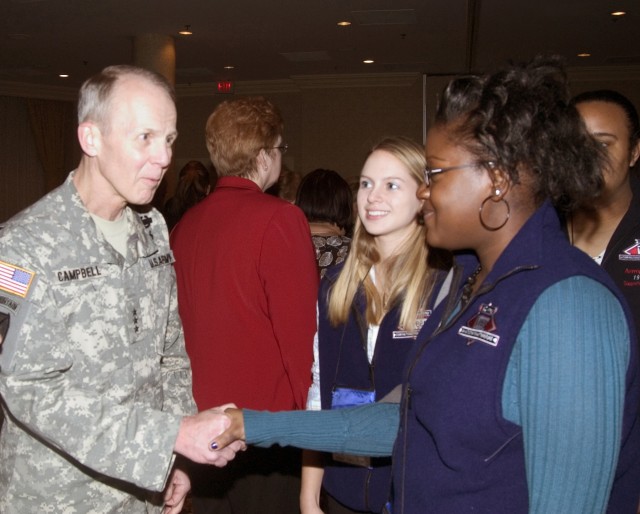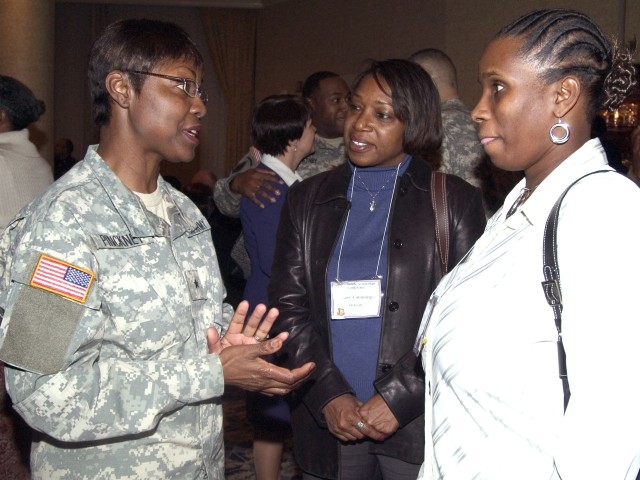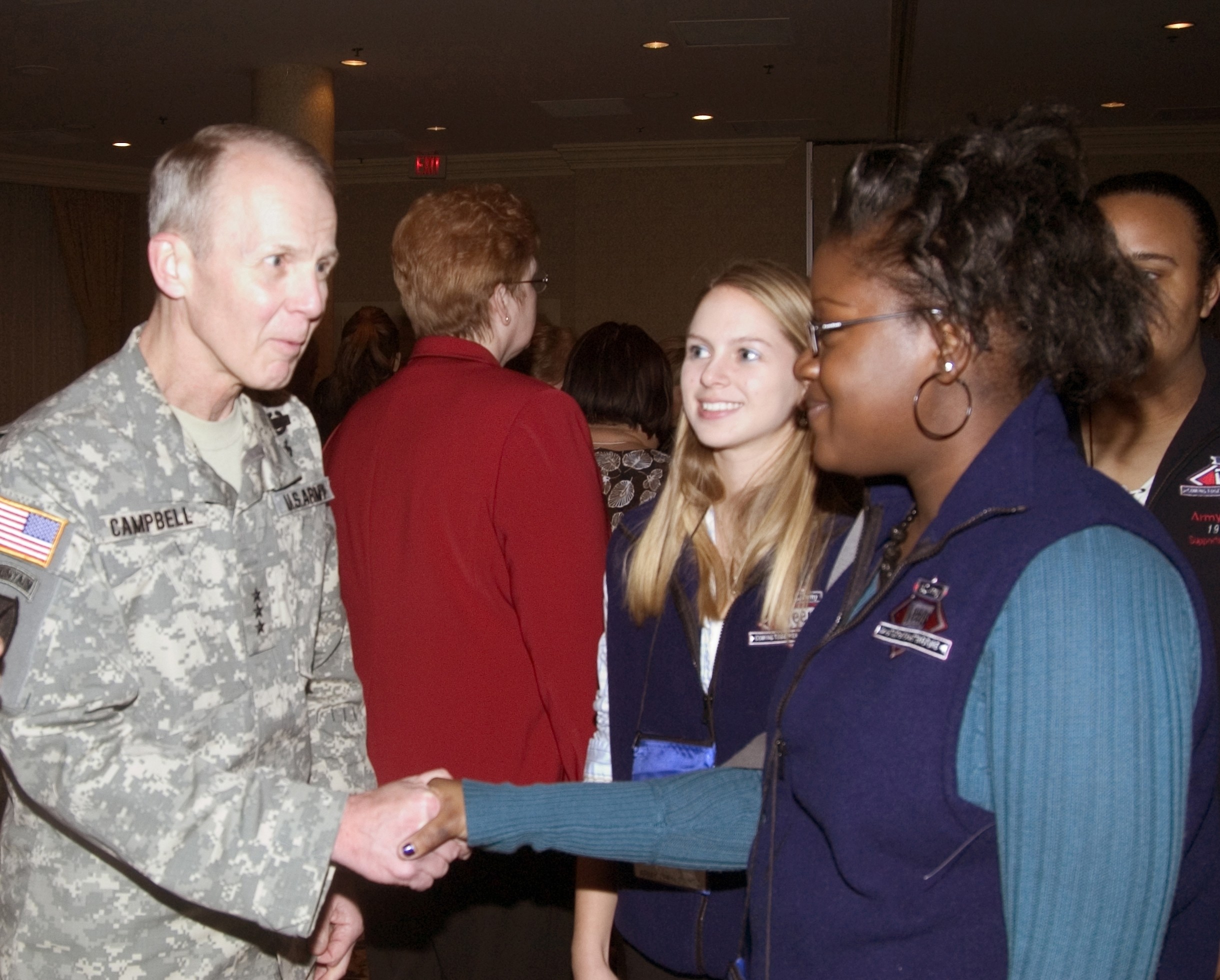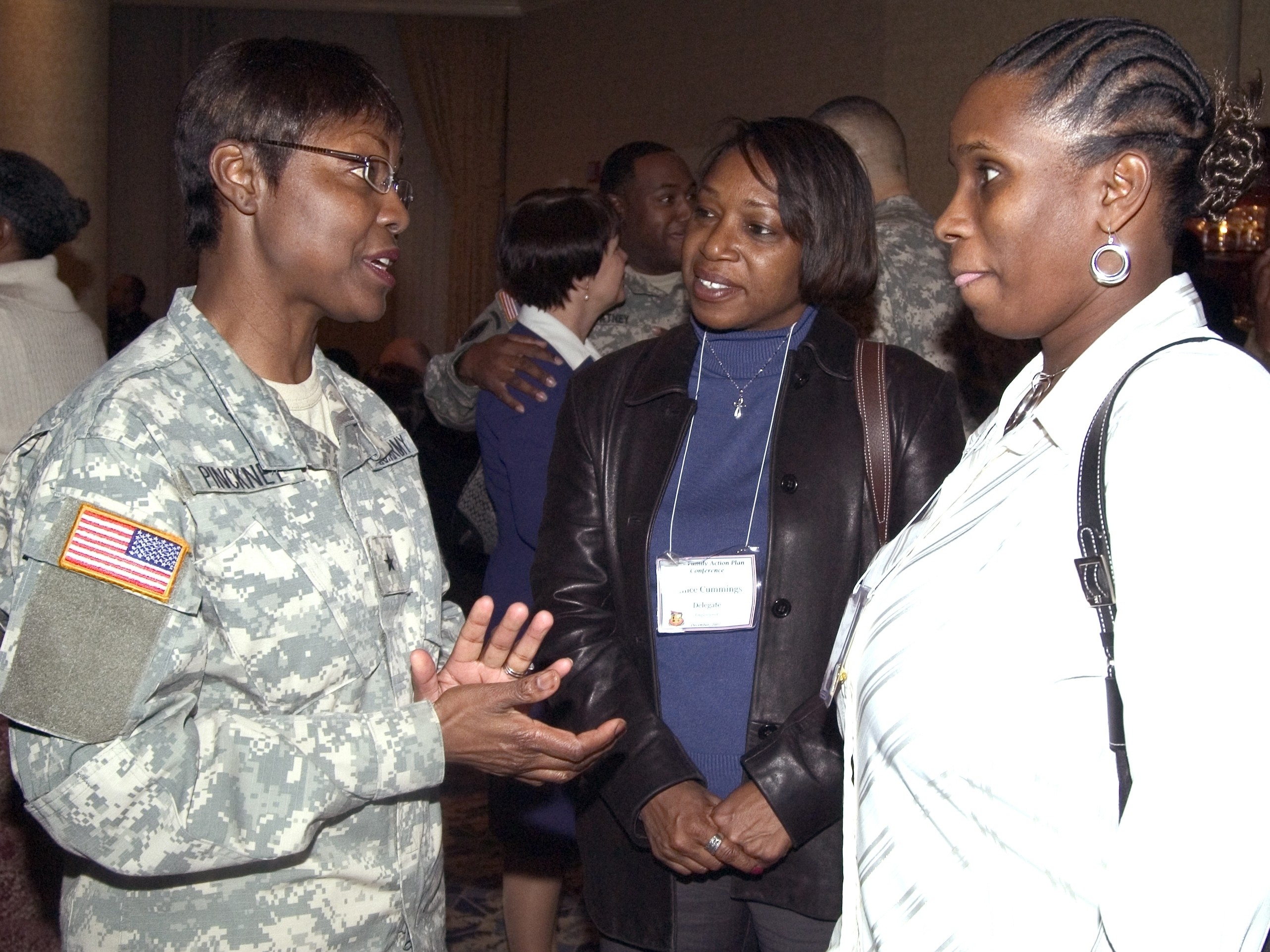By Margaret McKenzie
USAFMWRC Public Affairs
ALEXANDRIA, Va. -Delegates at the Army Family Action Plan conference reviewed 70 issues from Army installations throughout the world and 10 issues from the Army Wounded Warrior Symposium Dec. 3 through 7.
Each year, the delegates vote to determine the top 5 conference issues which are then briefed at the next General Officer Steering Committee. This year, seven issues will be reported as a result of a four-way tie.
Gen. George Casey, chief of staff of the Army, opened this year's conference with a call to action that seemed to predict a larger number of issues than usual being addressed and forwarded to the GOSC.
"I think this AFAP is going to be different because it is connected to the Army Family Covenant," Casey said. "I need for you to think about [AFAP] in those terms. I think we will get a lot more momentum because of this than we might have had in the past."
Casey said he has been an Army Family member for 59 years, and that the motto in the Casey Family, "make the best of it," is not what Families want right now.
"Listening to the Families, having been in Iraq, understanding what we are asking of them and having lost my own dad in Vietnam, I understand the impact war has on Families. They need more than that, and we are committed to delivering."
In June of 2008, the GOSC will review action plans for the following issues : minimum disability retirement pay for medically retired wounded warriors; Traumatic Service members Group Life Insurance for Post Traumatic Stress Disorder, traumatic brain injury and Uniplegia; and the Federal hiring process for Wounded Warriors. The issues caught in the four-way tie were: Health and Wellness Centers; medical care access for non-dependent caregivers of severely wounded soldiers; staffing to support the Physical Disability Evaluation System; and comprehensive behavioral health program for children. (See sidebar for a list of issues addressed by the December 2007 GOSC.)
AFAP was created in 1983 with the initial AFAP planning conference, and developed fully in 1984, the Year of the Army Family, as a program to help the Army address the needs and concerns of Family members. The program highlights the importance of Army Families and uses representatives of the Army Family from around the world to identify issues that will improve the standard of living for Soldiers and Families. AFAP provides a way for policy change to become a tangible end-product for Soldiers and their Families. It addresses quality-of-life issues for Soldiers, retirees, Department of Army civilian employees, and all their Family members.
The process allows for the voicing of what's working and what isn't - and provides a recommended solution to fix it. Senior Army leadership is alerted to areas of concern that need their attention, which gives them an opportunity to put plans into place to resolve the issues.
In the past 24 years 633 issues identified in the AFAP process have driven 101 legislative changes, 147 Department of Defense Army policy and regulatory changes and 165 improved programs and services.
"[AFAP] enables the military Family voice to reach from the lowest level all the way up to today's Secretary of the Army, the Vice Chief of Staff of the Army, the assistant of the Army for Manpower and Reserve Affairs, and the Sergeant Major of the Army," said Lt. Gen Benjamin C. Freakley, commander of the U.S. Army Accessions Command. "The Army leadership was here to hear about Army Families and I think their voices were heard."
"It is great today to see all the things that are unfolding like care for the military child in the local community and all the wonderful things that Gen. Pinckney has done to provide resources to dispersed Families," Freakley added.
Brig. Gen Belinda Pinckney is commanding general of the Family and Morale, Welfare and Recreation Command, which oversees the AFAP process to ensure that issues are referred to the appropriate agencies for resolution. Semi-annual GOSC meetings monitor the progress of each issue until it is resolved or deemed unattainable.
Secretary of the Army Pete Geren directed his comments at the GOSC attendees which included delegates from the annual AFAP conference, who make the grass roots process possible.
"I want to thank all of you for the great work that you've done to bring us where we are today," Geren said. "The initiatives that you all have brought forth from the grassroots already have begun to make a difference in the life of Families.
"But this is a project that will never be finished," he continued. "We must continue as an Army to adapt to the needs of Families, our all-volunteer force, its Soldiers, its spouses and its kids. And if we're going to sustain the health of this all-volunteer force, if we're going to sustain the existence of an all-volunteer force, we've got to make sure that as an Army, we meet the needs of every piece of that all-volunteer force. So I cannot overstate how important this initiative is."
The Secretary thanked all the participants from the various areas, agencies and installations around the Army and the Army community for their efforts and for putting other obligations on hold to commit to this effort.
"Thank you very much for what you do. Thank you for your leadership in this area, and I look forward to continuing to work with you on it," Geren said.
Delegates working the conference were impressed with the process and how it affects them personally through changes on the installations and in the communities that they represent.
I think this is a very important process," said Sgt. 1st Class Alanna Payne, a drill sergeant at Fort Jackson, S.C. "As an active duty Soldier, a lot of times changes come through, and you are aware that changes have been made but you don't realize the process. When you are part of the change and you see how things happen, it makes you appreciate the changes and you look at things in a different light.
"It takes on a different meaning when you see how many people are actually involved and what happens when we push issues forward from installations," she continued. "It gives me a new awareness and appreciation for the hard work that goes into this AFAP process."
Spc. Jonathan Maki, the president for the Better Opportunities for Single Soldiers from Grafenveer, Germany, pointed out that the statistics about the number of legislative changes that have been made through AFAP show how much senior leadership listens.
"I think the AFAP process is great because it brings awareness on programs that might not get the attention that they need," he said. "It brings the awareness directly to the senior leadership of the Army to say: 'Hey, we need some help.' The senior leaders do listen, and keep in mind, that is doing good for the Army."
"I am part of the BOSS program, which was an AFAP issue in 1989," Maki continued. "The single Soldiers make up more than 40 percent of the Army population and the AFAP process brought BOSS into focus."
As Assistant Chief of Staff for Installation Management and Commander of the Installation Management Command, Lt. Gen. Robert Wilson has been deeply involved in the AFAP process for a year and a half. "I think [AFAP] is hugely important to taking care of Soldiers and Families, and now that the Chief and Secretary have put a new emphasis on Family it is even going to make it more important to how we address our readiness issues."
The process and the life cycle of an issue brought up during AFAP doesn't end until a decision is made at the GOSC that the issue has been satisfactorily resolved or declared unattainable. The GOSC will meet June 4, 2008 to review issues identified during this conference, and to continue efforts to resolve issues identified in previous years.




Social Sharing